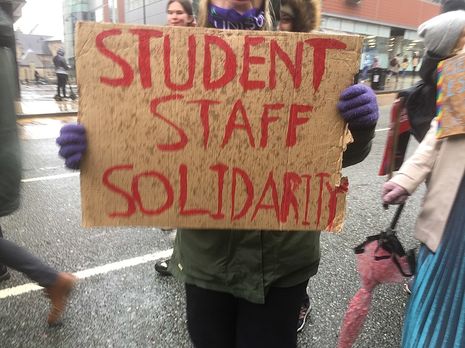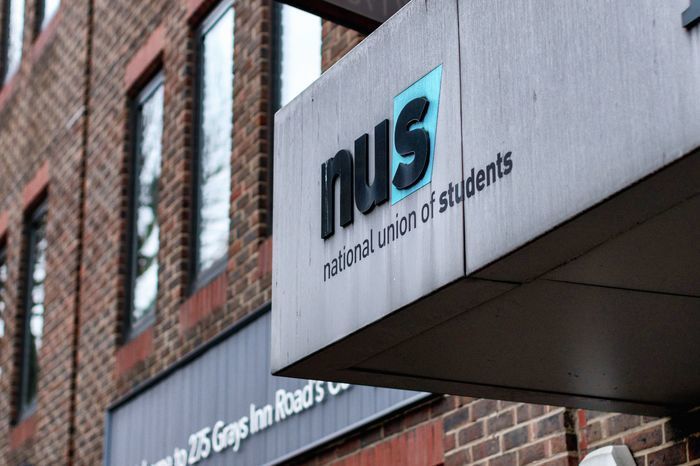The National Union of Students isn’t working
The National Union of Students (NUS) has harboured racists for too long, and Cambridge SU’s response has been woeful

The sacking of Shaima Dallali last Tuesday was a victory for students across the UK. Her antisemitism and tacit support for Islamic fundamentalism in the form of endorsing an extremist cleric as her “moral compass” put her entirely at odds with liberal student opinion. And while her removal is a step in the right direction, it does not solve the underlying issues which led to her election.
As a brief recap for those with a life, National Union of Students elections have been dominated by the hard left and anti-Israel movements under the umbrella of the aptly named “Red Square Movement” since Labour Students were temporarily abolished by radicals (it has thankfully since revived itself under fantastic new leadership). With it, the organised centre-left opposition collapsed, fuelling a vicious cycle of apathy, lack of accountability, and institutional rot. Students see less and less point in partaking in the SU-organised election of NUS delegates because the organisation consistently fails to represent us. This lack of participation has only weakened the moderate factions’ opposition to the Red Square Movement, allowing this hard left coalition and their follies to face little scrutiny.
The fact that students generally lean left wing is a fact as certain as death and taxes. Very few are those whose primary goal is to wish death to Israel and fewer still are committed Trotskyites. But these are the characters who have dominated recent NUS elections, placing the very union meant to be representing us students entirely out of step with student consensus.
Now, with the necessary sacking of Dallali, the ruling coalition has been fractured: the Federation of Student Islamic Societies, one of the most influential student societies within the NUS, is leading a disaffiliation campaign in retaliation for the sacking of the candidate they backed. Perhaps this may open up the political landscape for constructive change, but I am pessimistic.
Frankly, I do not know if the NUS can be saved
You need only look at the list of recent presidents to see how badly and consistently students, particularly Jewish students, have been let down within the last decade. Malia Bouattia, who was also accused of antisemitism, was elected in 2016 and provided a grim taste of what was to come. Sadly, she avoided facing the same fate as Dallali, not making the mistake of alienating her allies with religious dogma as Dallali did.
Larissa Kennedy, elected in 2021, put together the most recent NUS conference which can only charitably be described as a trainwreck. As part of celebrations for the hundredth anniversary of the founding of the NUS, Lowkey, a rapper who has a rather highkey laundry list of antisemitic remarks, was invited as a “liberation” speaker. When the Union of Jewish Students pointed out the blatant inappropriateness of this to Kennedy, she suggested Jewish students should simply migrate to a different room when Lowkey came on stage. I would have liked to see Kennedy, who has defended no platforming, make the same demeaning response to an accusation of any other form of racism. And while Lowkey was eventually disinvited, it took widespread media pressure to compel Kennedy into her about-turn.
The Lowkey controversy, however, was just the tip of the iceberg when it came to the conference this year. Voting on policy motions, deemed “too confrontational”, was replaced with “consensus-based decision making”, a Kafkaesque system which would look more in place in the Soviet Union than anything approaching a democracy. Instead of debating and then voting on motions as is usual anywhere else, delegates would indicate their preference for particular policies. Based on the input of the delegates, a committee of NUS hacks would then simply decide on a “consensus decision”. Quite unsurprisingly this very rarely represented the will of the elected delegates, instead handing power to the dwellers of the NUS bog.
Combined with the election of Dallali, many delegates, even those on the Left, ended the conference with utter contempt for the charade. Reading SU, who is now having a referendum to disaffiliate with the NUS, published an open letter after the conference describing the NUS as “wholly inadequate, a total waste of our money and a complete and utter failure”. I haven’t seen another description which rings more true.
Unlike Reading, Cambridge SU has unfortunately remained silent on the continued decline and mismanagement of the NUS, continuing to unthinkingly send over £8,000 a year to the broken organisation. Perhaps they share the NUS’ political interests but the likelihood is that they’re simply ambivalent about the matter and too lazy to make a change. After all, when delegates are given luxury suites at the Pullman for their stay at the conference, the NUS gravy train becomes rather difficult to hop off from.
Frankly, I do not know if the NUS can be saved. Perhaps, as with most things, it was always doomed for destitution once students stopped paying attention. It has gone from a politically significant force to an anti-democratic hovel squatted in by some of the most reprehensible people in student politics. I hope it dies and dies swiftly so we may build something out of its ashes and finally see politics working for students again.
 Comment / Plastic pubs: the problem with Cambridge alehouses 5 January 2026
Comment / Plastic pubs: the problem with Cambridge alehouses 5 January 2026 News / SU stops offering student discounts8 January 2026
News / SU stops offering student discounts8 January 2026 Theatre / Camdram publicity needs aquickcamfab11 January 2026
Theatre / Camdram publicity needs aquickcamfab11 January 2026 News / Cambridge academic condemns US operation against Maduro as ‘clearly internationally unlawful’10 January 2026
News / Cambridge academic condemns US operation against Maduro as ‘clearly internationally unlawful’10 January 2026 Comment / What happened to men at Cambridge?31 December 2025
Comment / What happened to men at Cambridge?31 December 2025










